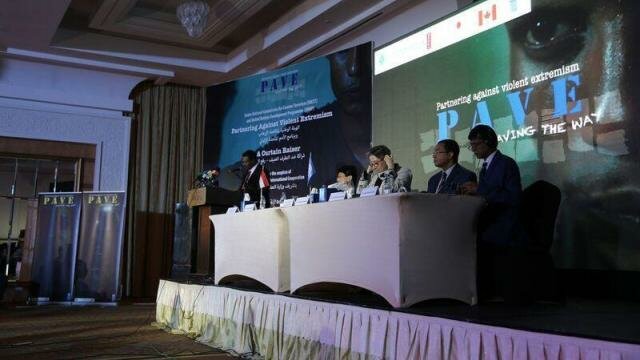
(UNDP SUDAN): Violent extremism has become a key issuein Africa and Arab regions. Sudan though was able to keep this issue
at a distance is still prone to risk, and especially it has been evident many people joined violent extremists over the last couple of years. Observing this threat, President Al Bashir has announced that Sudan is committed and will take all measures to tackle the issue of violent extremism and also will coordinate with the other countries in the region to collectively face this menace.
The Sudan National Commission for Counter Terrorism (SNCCT) has been given a mandate to counter and prevent this phenomenon, which have been actively working on addressing this issue. Talking on this specific issue during a conference jointly held by NACCT and United Nations Development Programme (UNDP) , Director General of Sudan National Commission for Counter Terrorism - Dr. Mohamed Jamal Eldin Ahmed stated thatSudan is a country at risk given the situation of the neighboring countries and influx of refugees. He mentioned about a joint study with UNDP to find the reasons for people joining violent extremism and he emphasized that Sudan isfirmly committed to face this critical issue and counter and prevent violent extremism.
Sudan hosted many regional conferences on the issue including an IGAD countries conference to seek the views of intelligentsia, religious leaders, women and youth groups to tackle this critical issue. Ministry of Guidance and Endowments organized a regional conference and congregated many Imams to listen to their views to find appropriate solutions for the issue. The Ministry of Information recently organized a conference for Arab media from different countries to find solutions and come up with appropriate media response across Arab nations.
The Sudan National Commission for Counter Terrorism (SNCCT) and the United Nations Development Programme (UNDP) have recently joined handsto commission a study in finding the reasons for why people join these extremist groups. The study not only help will help to understand the root causes of extremism but with a clear understanding will assist to come out with appropriate response and actions. The study will not only inform Sudan but also region to develop coordination. Against this background, both SNCCT and UNDP organized a meeting recently to discuss preliminary findings of a study to sensitize stakeholders on the gravity of this issue in Sudan. The final study is expected to be completed in early 2017. In the meeting held at Salam Rotana, H.E. State Minister of International Cooperation Mr. Hussein Elsharif Elhindi mentioned that Sudan will proceedon countering the extremism starting from the family, which is the first building block for the community and religion. He also mentioned that Sudanrecognizesthat this subject needs partnership as this is not confined to Sudan alone but affecting the entire region. He has appealed to all partners, stakeholders and friends to cooperate on this issue and affirmed the commitment and support from the Ministry towards such partnership. “
IN the same meeting , the UN Resident/Humanitarian Coordinator and UNDP Resident Representative Ms. Marta Ruedas highlighted that It is a problem that affects not only Sudan but the any countries in the region and therefore suggested that it requires strong partnerships among all stakeholders and affected parties in order to address this threat. She is of the opinion that Sudan should take lead as an example and also initiate such regional coordination
Japan has been supporting the efforts of UNDP on this issue and Acting Ambassador of Japan Mr. Hitoshi Nakamuramentioned that all Sudanese stakeholders would possibly benefit from such study as it is important to understand the process of extremism in order to prevent it. He mentioned that Japan stands by Sudan in its efforts to prevent the spread of violent extremism.
Ambassador of Canada Mr. Salah Eddine Bendaoud pointed out thatthe Violent Extremism is a universal problem today and noted that the prevention is an aspect of countering violent extremism and observed that it will need participation from all levels in the governments;civil societies and most of all local communities and individuals. He also felt that the raising awareness among youth is critical. He said Canada also is facing similar problems back home and that drives Canada to work with Sudan in this extremely important issue. He has appreciated the Government of Sudan for taking these steps with such a transparency
UNDP Country Director Dr. Selva Ramachandran stated that ” an empirical study is important to understand the root causes of violent extremism and stakeholders are looking to move forward to develop programmes response based on the solid evidence ofthe final study. He highly appreciated the partnership and support provided by the National Commission on Counter Terrorism”Many ambassadors and diplomatsincluding Italy, EU, Uganda, Kenya, India, and AUthought this issue is critical and recognized that such a study will help everybody in the region and other countries to formulate approaches and suggested a few steps to make it even stronger.
The event also witnessed a curtain raiser of the film “PAVE” which deals with five real time characters who were affected in Sudan. There are many people in Sudan who sincerely wish that this phenomenon should end and some of them feel that because of acts of 0.5% of Muslims, the rest of 99.5 % should not be put in a position to defend such a great religion as Islam, which talks about compassion, tolerance and peaceful co-existence. Some of them felt that western press is biased in projecting this phenomenon linked to the religion, which has danger in polarizing the world. They also felt that Islam in Sudan is about compassion and social cohesion.
This particular event and related activities have been welcomed by any scholars, academia and civil society that is a timely step in the right direction.
-
Sudanese-US Relations and Horizons of ProgressNext >

